Europe
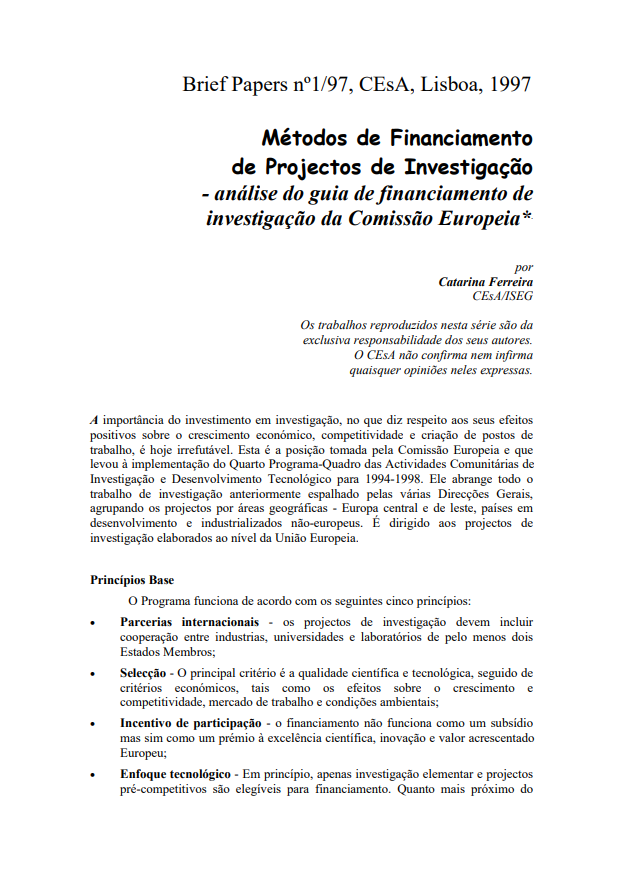
Brief Paper 1/1997: Métodos de Financiamento de Projectos de Investigação: Análise do guia de financiamento de investigação da Comissão Europeia
Resumo:
The importance of investment in research, in terms of its positive effects on economic growth, competitiveness and job creation, is now irrefutable. This is the position taken by the European Commission and which led to the implementation of the Fourth Framework Programme of Community Research and Technological Development Activities for 1994-1998. It covers all the research work previously spread across the various Directorates-General, grouping projects by geographical area – central and eastern Europe, developing countries and industrialised non-European countries. It is targeted at research projects carried out at European Union level. If the application is successful, the project coordinators are invited for contract negotiations – usually in Brussels or Luxembourg. Applicants must be prepared to provide more sophisticated information on the structure, implementation and costs of the project. For this purpose they receive forms that have to be filled in and submitted to the Commission within the specified period. Work on the project should not start until all the contractual negotiation stages are completed and the contract is signed by the partners and the Commission departments responsible. Métodos de financiamento de projectos de investigação: análise do guia de financiamento de investigação da Comissão Europeia has been prepared on the basis of the book EC research funding – a guide for applicants, European Commission, Office for Official Publications of the European Communities, Brussels-Luxembourg. 1996, 205p.
Citação:
Ferreira, Catarina. 1997. “Métodos de financiamento de projectos de investigação: análise do guia de financiamento de investigação da Comissão Europeia”. Instituto Superior de Economia e Gestão – CEsA. Brief papers nº 1-1997.
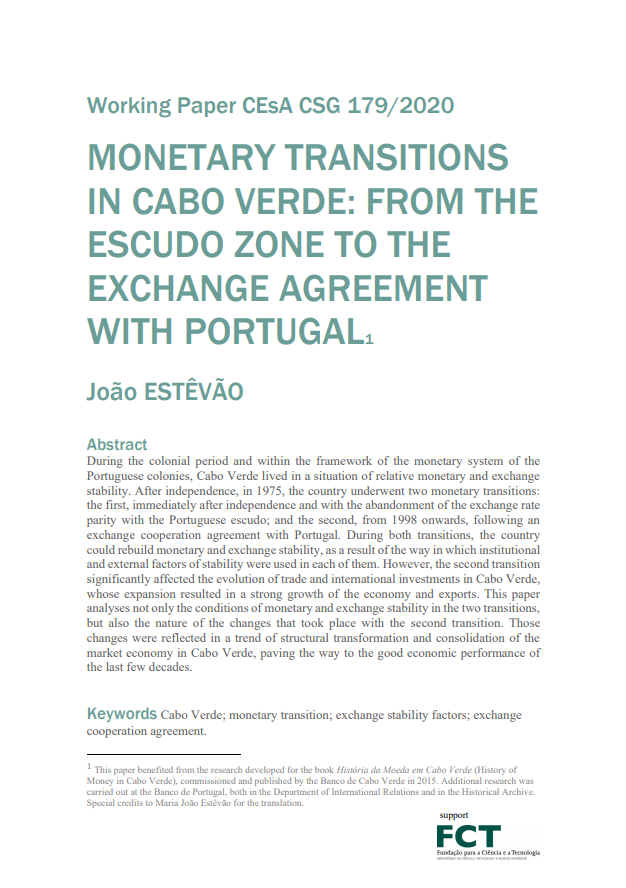
Working Paper 179/2020: Monetary Transitions in Cabo Verde: From the escudo zone to the exchange agreement with Portugal
Abstract:
Monetary Transitions in Cabo Verde: From the escudo zone to the exchange agreement with Portugal studies how, during the colonial period and within the framework of the monetary system of the Portuguese colonies, Cape Verde lived in a situation of relative monetary and exchange rate stability. After independence in 1975, the country underwent two monetary transitions: the first, immediately after independence and with the abandonment of parity with the Portuguese escudo; and the second, from 1998 onwards, following an exchange rate cooperation agreement with Portugal. During both transitions, the country was able to rebuild monetary and exchange rate stability, depending on how institutional and external stability factors were used in each of them. However, the second transition significantly affected the evolution of international trade and investment in Cape Verde, whose expansion resulted in strong growth in the economy and exports. This article analyses not only the conditions of monetary and exchange rate stability in the two transitions, but also the nature of the changes that occurred with the second transition. These changes translated into a trend of structural transformation and consolidation of the market economy in Cape Verde, paving the way for the good economic performance of recent decades.
Quotation:
Estêvão, João (2020). “Monetary transitions in Cabo Verde : from the escudo zone to the exchange agreement with Portugal”. Instituto Superior de Economia e Gestão – CEsA/ CSG – Documentos de Trabalho nº 179/2020.
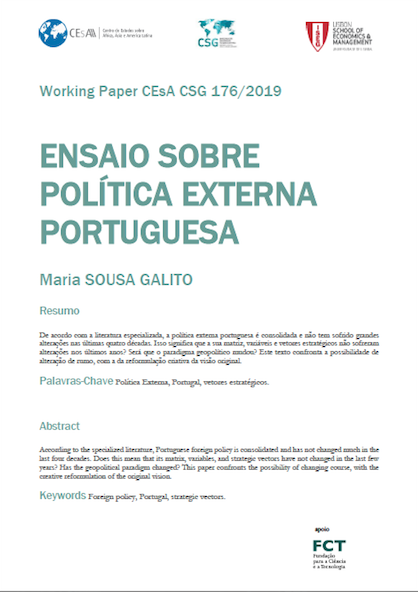
Working Paper 176/2019: Ensaio sobre Política Externa Portuguesa
Abstract:
In general, Portuguese foreign policy is “consolidated” and has not undergone “sudden changes of direction”. According to the national government, the founding matrix remains “well present and consolidated” although “denser, richer, broader”. What exactly does this mean? Our strategic vectors of foreign policy used to be three (Europe, Atlantic and Lusophony). Since the 1990s, some authors have admitted adding a complementary strategic pillar to the previous model. Which one? Three hypotheses. First, security, focusing on the international missions of the Portuguese Armed Forces within the framework of NATO (North Atlantic Treaty Organization), the EU (European Union) or the UN (United Nations). Secondly, cooperation, mainly technical and cultural, with Portuguese-speaking countries, but also with third countries. Thirdly, economic diplomacy, with exports, the diversification of the investment portfolio, the opening of the internal market to the world (and not only to the EU). According to specialized literature, Portuguese foreign policy is consolidated and has not undergone major changes in the last four decades. Does this mean that its matrix, variables and strategic vectors have not changed in recent years? Has the geopolitical paradigm changed? Ensaio sobre Política Externa Portuguesa confronts the possibility of a change of course, with that of the creative reformulation of the original vision.
Quotation:
Galito, Maria Sousa (2019). “Ensaio sobre política externa portuguesa”. Instituto Superior de Economia e Gestão – CEsA/ CSG – Documentos de Trabalho nº 176/2019.
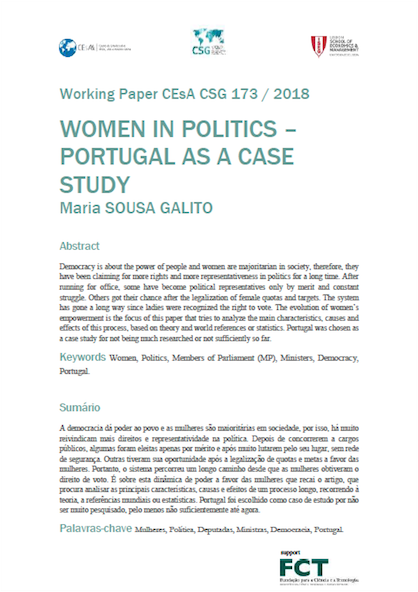
Working Paper 173/2018: Women in Politics: Portugal as a case study
Abstract:
Democracy is about the power of the people. In order to sustain, implies (at least) representativeness of its major groups. When majority rules minorities, lobbies complain when not happy and some of their demands are met; but the system doesn’t turn totally in their favor if it goes against the interests of a larger assembly. When minority rules the majority, problems arise (populism against elite, for instance); and sooner or later there’s a significant shift in society. Quantity gives power. Numbers do count in Democracy. Women are the majority of the population. It was not always so, but nowadays it’s an unquestionable fact. For cultural, institutional or socioeconomic reasons they were submissive for centuries to a system that did not recognize their public activity. They were not involved in decision making and rebel against that. At first, their demands were not met. But waves are changing. As long as democracy prevails and women’s numbers and percentages won’t drop, they’ll probably continue to raise awareness to their cause, increasing their power and influence in society. The evolution of women’s empowerment is the focus of Women in Politics: Portugal as a case study, that tries to analyze the main characteristics, causes and effects of this process, based on theory and world references or statistics. Portugal was chosen as a case study for not being much researched or not sufficiently so far.
Quotation:
Galito, Maria Sousa (2018). “Women in politics : Portugal as a case study”. Instituto Superior de Economia e Gestão – CEsA/ CSG – Documentos de Trabalho nº 173/2018.
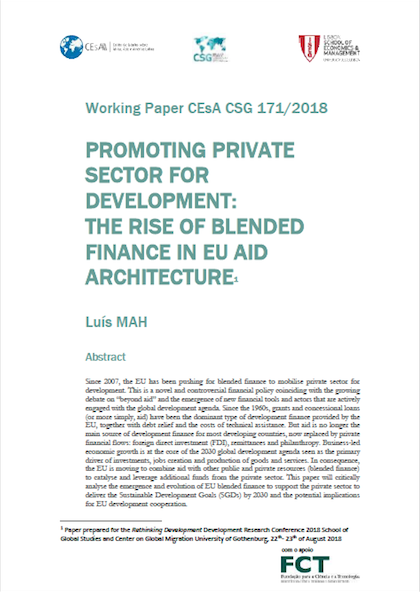
Working Paper 171/2018: Promoting Private Sector for Development: The rise of blended finance in EU aid architecture
Abstract:
Since 2007, the EU has been pushing for blended finance to mobilise private sector for development. This is a novel and controversial financial policy coinciding with the growing debate on “beyond aid” and the emergence of new financial tools and actors that are actively engaged with the global development agenda. Since the 1960s, grants and concessional loans (or more simply, aid) have been the dominant type of development finance provided by the EU, together with debt relief and the costs of technical assistance. But aid is no longer the main source of development finance for most developing countries, now replaced by private financial flows: foreign direct investment (FDI), remittances and philanthropy. Business-led economic growth is at the core of the 2030 global development agenda seen as the primary driver of investments, jobs creation and production of goods and services. In consequence, the EU is moving to combine aid with other public and private resources (blended finance) to catalyse and leverage additional funds from the private sector. Promoting private sector for development: the rise of blended finance in EU aid architecture will critically analyse the emergence and evolution of EU blended finance to support the private sector to deliver the Sustainable Development Goals (SGDs) by 2030 and the potential implications for EU development cooperation.
Quotation:
Mah, Luís (2018). “Promoting private sector for development : the rise of blended finance in EU aid architecture”. Instituto Superior de Economia e Gestão – CEsA /CSG – Documentos de Trabalho nº 171/2018.
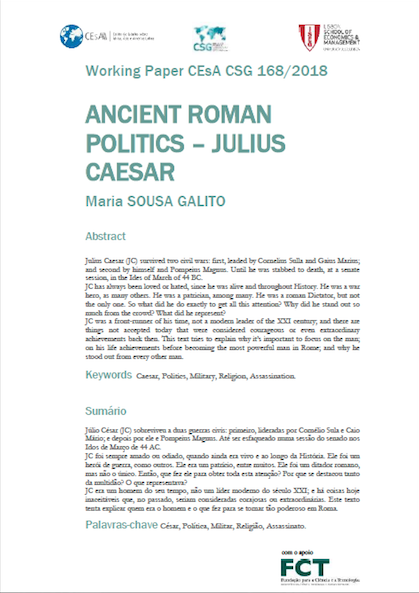
Working Paper 168/2018: Ancient Roman Politics – Julius Caesar
Abstract:
Ancient Roman Politics – Julius Caesar revisits Julius Caesar, one of the most famous conquerors of all time. Many books have been written about him, but not in a neutral way. The texts are usually attached to a political ideology. But reducing his persona to dictatorship can blind people to what he represented to his fellow Romans and who he really was as a man. Julius Caesar survived two civil wars: first led by Cornelius Sula and Gaius Mario; and then by him and Pompey Magnus. Until he was stabbed in a senate session in the Ides of March 44 BC. Julius Caesar was always loved or hated, when he was still alive and throughout history. He was a war hero, like others. He was a patrician, among many. He was a Roman dictator, but not the only one. So what did he do to get all this attention? Why did he stand out so much from the crowd? What did he represent? Julius Caesar was a man of his time, not a modern leader of the 21st century; and there are things unacceptable today that in the past would have been considered courageous or extraordinary. This text tries to explain who the man was and what he did to become so powerful in Rome.
Quotation:
Galito, Maria Sousa (2018). “Ancient Roman Politics – Julius Caesar”. Instituto Superior de Economia e Gestão – CEsA/CSG – Documentos de Trabalho nº 168/2018
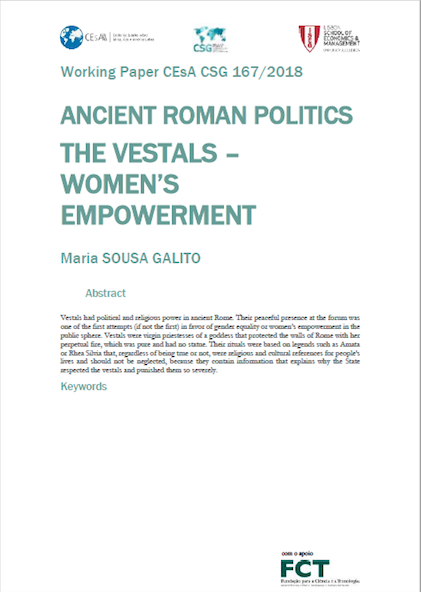
Working Paper 167/2018: Ancient Roman Politics the Vestals – Women’s empowerment
Resumo:
Ancient Roman Politics the Vestals – Women’s empowerment is about vestal virgins of ancient Rome. First chapter concerns goddess Vesta, her legends and what she represented. Second chapter is about who Vesta and why her priestesses were important to roman religion. Third chapter explains where they lived. Four chapter lists names of known vestals until Emperor Tiberius (a larger list is included in Appendix 2) and discusses situations involving their deaths or role model. Vestals had political and religious power in ancient Rome. Their peaceful presence at the forum was one of the first attempts (if not the first) in favor of gender equality or women’s empowerment in the public sphere. Vestals were virgin priestesses of a goddess that protected the walls of Rome with her perpetual fire, which was pure and had no statue. Their rituals were based on legends such as Amata or Rhea Silvia that, regardless of being true or not, were religious and cultural references for people’s lives and should not be neglected, because they contain information that explains why the State respected the vestals and punished them so severely.
Citação:
Galito, Maria Sousa (2018). “Ancient roman politics the vestals – women’s empowerment”. Instituto Superior de Economia e Gestão – CEsA/ CSG Documentos de Trabalho nº 167/2018.
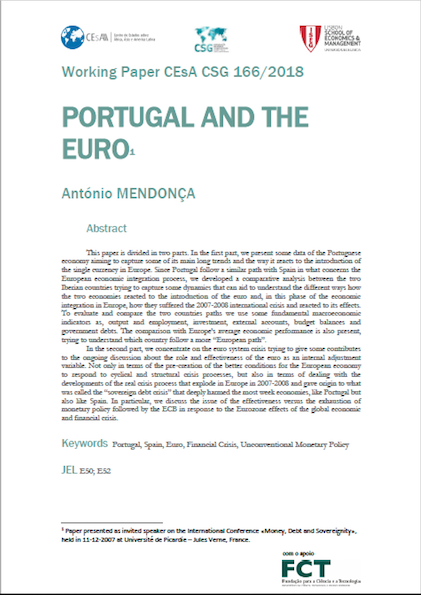
Working Paper 166/2018: Portugal and the Euro
Abstract:
Portugal and the Euro is divided in two parts. In the first part, we present some data of the Portuguese economy aiming to capture some of its main long trends and the way it reacts to the introduction of the single currency in Europe. Since Portugal follow a similar path with Spain in what concerns the European economic integration process, we developed a comparative analysis between the two Iberian countries trying to capture some dynamics that can aid to understand the different ways how the two economies reacted to the introduction of the euro and, in this phase of the economic integration in Europe, how they suffered the 2007-2008 international crisis and reacted to its effects. To evaluate and compare the two countries paths we use some fundamental macroeconomic indicators as, output and employment, investment, external accounts, budget balances and government debts. The comparison with Europe’s average economic performance is also present, trying to understand which country follow a more “European path”. In the second part, we concentrate on the euro system crisis trying to give some contributes to the ongoing discussion about the role and effectiveness of the euro as an internal adjustment variable. Not only in terms of the pre-creation of the better conditions for the European economy to respond to cyclical and structural crisis processes, but also in terms of dealing with the developments of the real crisis process that explode in Europe in 2007-2008 and gave origin to what was called the “sovereign debt crisis” that deeply harmed the most week economies, like Portugal but also like Spain. In particular, we discuss the issue of the effectiveness versus the exhaustion of monetary policy followed by the ECB in response to the Eurozone effects of the global economic and financial crisis.
Quotation:
Mendonça, António (2018). “Portugal and the Euro”. Instituto Superior de Economia e Gestão – CEsA/ CSG – Documentos de Trabalho nº 166/2018.
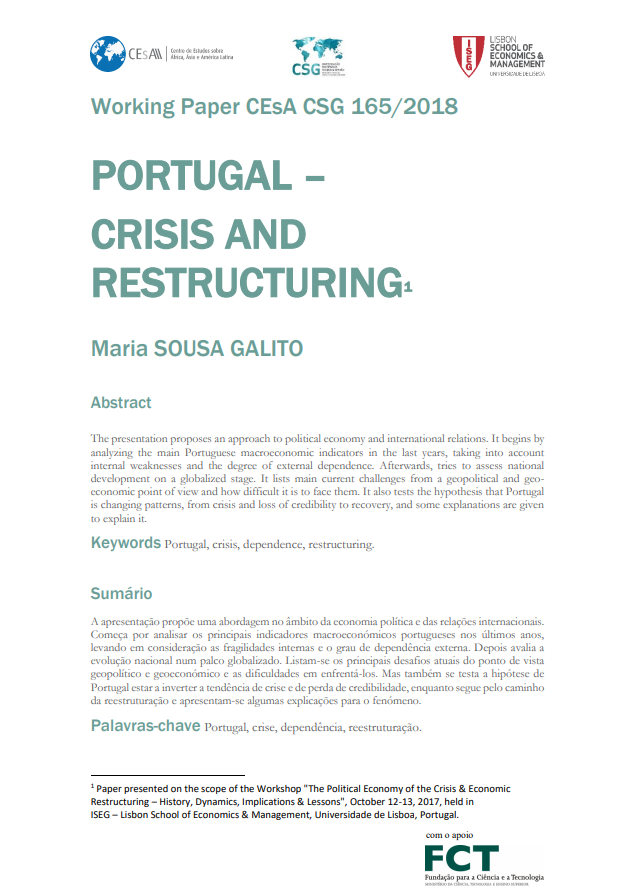
Working Paper 165/2018: Portugal: crisis and restructuring
Abstract:
Portugal is a southwestern country with a strategic triangle including two archipelagos and a territorial slice of the Iberian Peninsula. It’s a State-member of the European Union (EU) since 1986. After 2008 faced financial and economic restrain and asked for financial external help from Troika (IMF, European Commission and European Central Bank) between 2011/14. Taking that in mind, Portugal: crisis and restructuring contextualizes Portugal’s present situation and its trends for the last ten or less years. The first chapter analysis main macroeconomic indicators of Portugal, including the GDP, imports and exports specific performance, consumer price index, net lending/ borrowing by institutional sector, and sovereign ratings from the biggest international agencies. The second chapter evaluates some of the country’s inner fragilities, such as lack of industrialization and unbalanced GVA and Employment between major sectors (agriculture, services and industry), Risk of Poverty, Unemployment Rates and major demographic trends. The third chapter focus on external dependence; studies indicators in percentage of the GDP, like the Liquid External Debt, Emigrants’ Remittances, Public Transferences from and for the EU, but also the Geographical Distribution of Exports and Imports of Goods by Regions and by countries, and of Foreign Direct Investment (FDI) by Countries. The fourth chapter examines the overseas AICEP network, the Global Peace Index, The Travel & Tourism Competitiveness Index and Portuguese indicators like the revenue and number of bed nights by country of origin. A final chapter has a summarized critical assessment about the hypothesis of the EU becoming a federation and Portugal’s part in it. The presentation proposes an approach to political economy and international relations. It begins by analyzing the main Portuguese macroeconomic indicators in the last years, taking into account internal weaknesses and the degree of external dependence. Afterwards, tries to assess national development on a globalized stage. It lists main current challenges from a geopolitical and geo-economic point of view and how difficult it is to face them. It also tests the hypothesis that Portugal is changing patterns, from crisis and loss of credibility to recovery, and some explanations are given to explain it.
Quotation:
Galito, Maria Sousa (2018). “Portugal: crisis and restructuring”. Instituto Superior de Economia e Gestão – CEsA/ CSG – Documentos de Trabalho nº 165/2018.
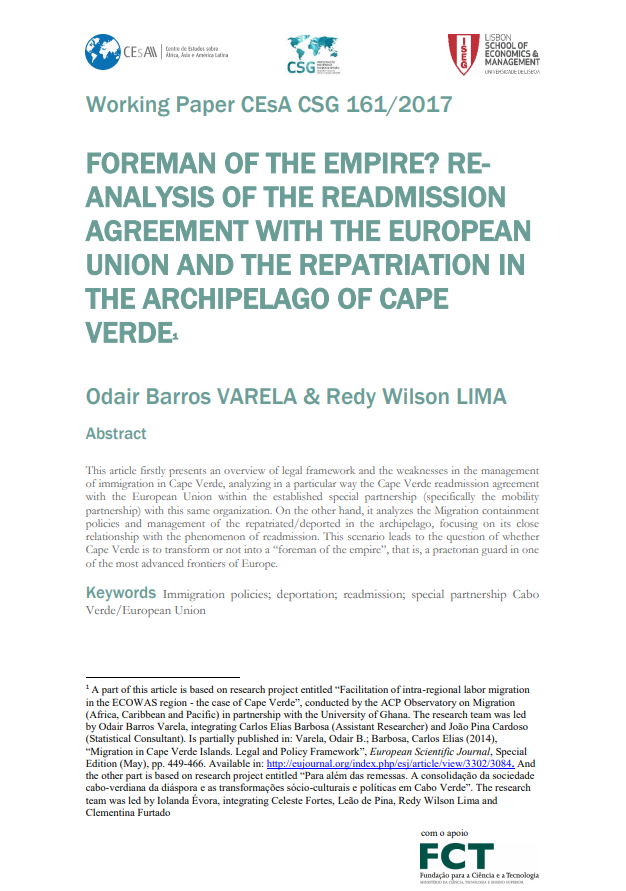
Working Paper 161/2017: Foreman of the Empire? Re-analysis of the readmission agreement with the European Union and the repatriation in the archipelago of Cape Verde
Abstract:
This article firstly presents an overview of legal framework and the weaknesses in the management of immigration in Cape Verde, analyzing in a particular way the Cape Verde readmission agreement with the European Union within the established special partnership (specifically the mobility partnership) with this same organization. On the other hand, it analyzes the Migration containment policies and management of the repatriated/deported in the archipelago, focusing on its close relationship with the phenomenon of readmission. This scenario leads to the question of whether Cape Verde is to transform or not into a “foreman of the empire”, that is, a praetorian guard in one of the most advanced frontiers of Europe. Trying to understand the complexity of migration to Cape Verde Island, one should also highlight the historical importance of links on the mobility of people, which played a key role in disseminating information and contacts between the pre-colonial societies. It should also refer to the implications of European colonial process in migration dynamics in the African continent, with the delineation of borders, through the recruitment of work force, or by using strategies for planning political and administrative control of the populations.
Quotation:
Varela, Odair Barros e Redy Wilson Lima (2017). “Foreman of the Empire? Re-analysis of the readmission agreement with the European Union and the repatriation in the archipelago of Cape Verde”. Instituto Superior de Economia e Gestão – CEsA/CSG – Documentos de Trabalho nº 161/2017.





